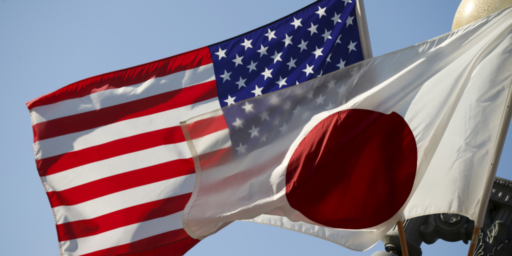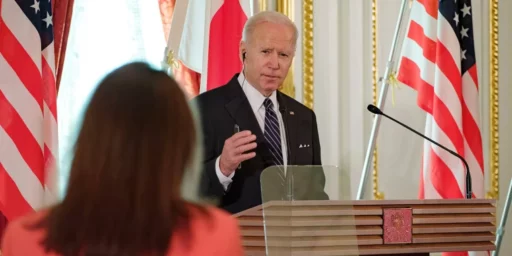The Asian Economic Slump
Japan’s economy is in its greatest downturn in 50 years:
Feb. 9 (Bloomberg) — Japan’s economy is deteriorating at a pace unseen in the past half century, the central bank’s chief economist said.
“Japan’s recent economic decline is faster than that of the U.S., which has been experiencing the worst financial crisis in a century,” Kazuo Momma, head of research and statistics at the Bank of Japan, said in a speech in Tokyo today.
Bank of Japan policy makers last month forecast the steepest contraction in the postwar era as exports dry up. Nissan Motor Co. today said it will cut 20,000 jobs and post a net loss this fiscal year, the latest casualty of Japan’s export collapse that has forced Toyota Motor Corp., Panasonic Corp., Hitachi Ltd. and Sony Corp. to predict losses and shed workers.
Momma said the world’s second-largest economy may have shrunk at an “unimaginable” speed last quarter and is likely to slump at a similar rate or worse in the three months ending March.
Gross domestic product fell at an annual 11.7 percent pace in the fourth quarter of 2008, according to the median estimate of 23 economists surveyed by Bloomberg News. That would be the steepest decline since 1974. The GDP figures are scheduled for release on Feb. 16.
You’ll have to forgive me. I just can’t resist. Momma knows best.
BEIJING (AP) — It is China’s disconcerting secret: Its economic slump is much deeper than official data show.
The government says the economy grew by 6.8 percent in the final quarter of 2008, but that is based on an outdated system that measures growth against the same period a year earlier.
Compared to the previous quarter, the method used by most major economies, growth was about 1 percent at an annual pace and possibly zero, economists say.
“We sharply decelerated in November and December,” said Standard Chartered economist Stephen Green. “There are no clear signals we have accelerated.”
If China’s economy is indeed barely growing, that would dash hopes China, the world’s third-largest economy, might drive the world out of recession. It also means communist leaders face a tougher challenge than outsiders might think as they scramble to stem a flood of job losses and ignite a recovery.
The prevailing wisdom in China is that China needs robust growth to avoid social unrest. They shouldn’t depend on exports for that growth:
Feb. 9 (Bloomberg) — China’s exports probably fell by the most in a decade in January as demand dried up in the U.S. and Europe, making it harder to revive growth in the world’s third- biggest economy.
Shipments tumbled 14 percent from a year earlier, the third straight monthly decline, after falling 2.8 percent in December, according to the median forecast of 15 economists surveyed by Bloomberg News. The figure is due Feb. 11.
Consumer sentiment in Europe, the nation’s biggest export market, declined to a record low in January in the face of the worst recession since World War II. China’s slumping exports and weakest economic growth in seven years have cost the jobs of 20 million migrant workers, damped confidence and discouraged investment.
While the U. S. is China’s biggest single customer, the EU taken as a whole is a larger market for Chinese goods.
The decline in the Chinese economy is spilling over into Taiwan:
Feb. 9 (Bloomberg) — The Taiwan dollar is starting to feel the pain of China’s economic slowdown as exports from the island to the mainland decline.
Changshu Shengtian Knitting & Clothing Co. in China stopped ordering cloth from Taiwan this year and began buying less-expensive local fabric because “there’s no sign of even a slight increase in overseas orders this year,” said Tang Zhenya, a salesman at the company in the eastern city of Changshu. “So we turned back to cheaper mainland suppliers.”
China’s customs bureau reported that imports from the rest of Asia plunged to $43 billion in December, from a record of $70 billion in July. Asian countries that depend on exports to their neighbors will suffer the most from the 39 percent collapse in the trade, according to CLSA Asia-Pacific Markets, which predicted last week that Taiwan and Singapore’s economies will shrink at least 10 percent this year.
South Korea is starting to feel the pinch, too:
SEOUL, Feb. 3 (Xinhua) — The International Monetary Fund (IMF) predicted Tuesday the South Korean economy will decline 4 percent for 2009 due to decrease in domestic demand and exports amid the global economic recession.
On January 24, the IMF made a projection of a 2 percent growth in South Korea’s economy in 2009. However, after it adjusted its forecast on the global economy growth from 2.2 percent to 0.5 percent last week, the IMF sharply reduced their predictions for South Korea to negative growth.
That compares with a 4.1% growth last year.
These economies are all highly interrelated and are all substantially export-driven. Europe’s and America’s problems are Japan’s, China’s, South Korea’s, and Taiwan’s. Economies are like investment portfolios. You should hedge your bets by diversifying.
Keep your eyes on the Far East for signs of how the global economic downturn will unfold. If the four countries I’ve highlighted above start addressing their own structural problems, all may be well. If they rely on the U. S. and Europe to pull them out of the slump either by devaluing their currencies or increasing export subsidies, expect a bumpy ride.





What I find amazing is that Japan has quite a bit of public works spending. They are busy paving over every unpaved part of Japan and yet they are still in an economic malaise/downturn. What gives I thought massive government spending was a magic bullet! Spend, spend, spend, and viola!! Economic prosperity. Wait, I know their public debt needs to be 200% of GDP, not merely 180% of their GDP.
Here is an article on Japan’s fiscal experiment.
Thank God…err…Obama we have Obama.
I think the infatuation with spending as fiscal stimulus has several different sources. First, I think that its supporters are using a perfect stimulus (sort of like a perfect gas) as a yardstick rather than any real stimulus package that can be passed into law. Second, I think a lot of the prominent supporters imagine themselves as prospective commissars in charge of passing out the dough. And imagine if it worked! You could keep the economy growing just by spending (the fallacy of appeal to consequences).
I’ve read of Japanese public works corruption going back a decade. It’s wrong to file it under American stimulus scenarios. Not unless we Chicago-ize the nation in the OLD sense.
Japan under Construction: Corruption, Politics, and Public Works
People bringing up Japanese public works in context of our stimulus bill don’t have the Japanese context, IMNSHO.
The name is actually pronounced closer to Mon-ma, and seems to be here the victim of unfortunate romanization.
Came over via the link from Kevin Drum. Good post.
A propos your last point (i.e., let’s hope Asian countries address their own structural problems and not hope for US/EU exports to pull them out of the slump) – a high-ranking Chinese official whose name and position I can’t remember at least made the right noises a few days ago in an interview on the BBC World Service’s business show. He acknowledged that internal consumption has to be a major driver of Chinese recovery and growth, and that dependence on US consumers cannot be the long-term strategy. Obviously we’ll have to wait and see what really happens, but at least they’re starting to talk the right game.